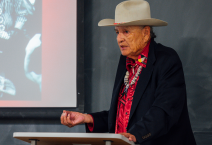Lori J. Daggar
Lori Daggar specializes in early North American history, with a particular focus on Indigenous histories and the history of U.S. empire.
Her first book, Cultivating Empire, charts the connections between missionary work, capitalism, and Native politics to understand the making of the American empire in the eighteenth and early-nineteenth century. It links eighteenth- and early-nineteenth-century U.S. Indian policy—often framed as benevolent by its crafters—with the emergence of racial capitalism in the United States. Rather than understand civilizing missions simply as tools for assimilation, then, Cultivating Empire reveals that missions were hinges for U.S. economic and political development that could both devastate Indigenous communities and offer Native peoples additional means to negotiate for power and endure.
Her next book project, supported by a grant from the National Endowment for the Humanities (NEH), examines Native peoples’ ideas, actions, and experiences during the Age of Revolutions in North America and the Atlantic World.
Lori Daggar is also a member of the Welcome Home project at Ursinus, a collaborative effort undertaken with the Delaware Tribe of Indians and the Perkiomen Valley School District.
Degrees
B.A., Nazareth College
M.A., University of Pennsylvania
Ph.D., University of Pennsylvania
Teaching
HIST 125: Defining America: Early America in its Global Contexts
HIST/ENGL 212: Bears Make History (DH course)
HIST 225: Native North America
HIST/GWSS 227: Witches, Drudges, and Good Wives: Gender, Race, and Sex in Early America
HIST 307: The Age of Revolutions in the Atlantic World
HIST322: Making American Empire
HIST 330: Street Scrapers, Seamstresses, and the Enslaved: Work and Labor in Early America
HIST 350: Early North America and the Atlantic World
HIST 425W: Native American Activism
CIE 200: Common Intellectual Experience (first-year seminar)
Professional Experience
Mellon Periclean Faculty Leader Grant, Mellon Foundation/Eugene M. Lang Foundation, 2025
Grant recipient, National Endowment of the Humanities (NEH) Summer Stipend, 2023-2024
Fellow, Bright Institute at Knox College, 2018-2020 (extended to 2021 due to COVID-19)
Advisory Council, McNeil Center for Early American Studies (2016-present)
Research Interests
Early North American History
Indigenous History and Survivance
American Empire
History of Capitalism and Philanthropy
Religion and Missionaries
Recent Work
Book
Cultivating Empire: Capitalism, Philanthropy, and the Negotiation of American Imperialism in Indian Country (Philadelphia: University of Pennsylvania Press, 2022)
Peer-Reviewed Articles and Book Chapters:
Co-author, “Tending to Reconciliation with the Lenape: The Role of Ursinus College’s Food Forest in Supporting Reconnection with Culturally Important Species in Lenapehoking” in Lori V. Quigley and Hugh Burnam, eds., On Indian Ground: Northeast, under review.
“Survivance and the Myth of the ‘Vanishing Indian’” in AM Research Skills: Ethnic and Indigenous Studies (Marlborough: AM, 2025), in production.
“The White River Witch-Hunt and Indigenous Peoples’ Negotiations with Missionaries in the Era of the Early Republic,” in Benjamin Park, ed., Religion in American History (Wiley-Blackwell Publishing, 2021).
“‘A Damnd Rebelious Race’: The U.S. Civilization Plan and Native Authority,” in Ignacio Gallup-Diaz and Geoffrey Plank, eds., Quakers and Native Americans (Brill Press, 2019).
“The Mission Complex: Economic Development, ‘Civilization’ and Empire in the Early Republic,” Journal of the Early Republic, vol. 36, no. 3 (Fall 2016).
Selected Book Reviews and Invited Review Essays:
“Warring for America, Warring for a Continent.” Journal of the Early Republic. Vol. 39, no. 4 (Winter 2019): 737-744.
Review of Ben-zvi, Yael. Native Land Talk: Indigenous and Arrivant Rights Theories. Early American Literature, Spring 2019.
Review of John Reda, From Furs to Farms: The Transformation of the Mississippi Valley, 1762-1825. Journal of the Early Republic, Vol. 38, No. 2 (Summer 2018): 352-354.
“Indigenous History and Imperial America: American Indian History Today and Tomorrow,” Reviews in American History, Vol. 45, No. 3 (September 2017): 378-383.
Selected Invited Talks
“The Revolution in Indian Country: Imperial Violence and the Push for Indigenous Sovereignty,” Young People’s Continental Congress, Philadelphia, PA, July 2024
Panelist, “The Battle for the American West,” National Constitution Center, November 2022.
“‘The Best and Cheapest Way to Get Rid of Them’: Philanthropy, Economy, and the Politics of Exclusion in Indian Country,” McNeil Center for Early American Studies, The Center Seminar Series, 2017.
“The Society of Friends, Early U.S. Indian Policy, and the Making of American Empire,” Haverford College, 2017.
Selected Conference Presentations
“Diplomacy and the Negotiation of American Empire in Indian Country,” American Society for Ethnohistory Annual Conference, 2018
“Speculative Philanthropy, Indigenous Dispossession, and the Making of American Empire,” Society for Historians of the Early American Republic Annual Meeting, 2018.
“Philanthropy and Profit in Indian Country,” Omohundro Institute Annual Conference, 2018
“‘A Damnd Rebelious Race’: Negotiating ‘Civilization’ Policies in the Ohio Country,” Native American and Indigenous Studies Association Annual Meeting, 2018.




